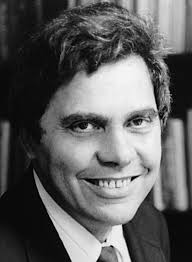Neil Postman
| Neil Postman | |
|---|---|
 |
|
| Born |
March 8, 1931 New York, New York, U.S. |
| Died | October 5, 2003 (aged 72) New York, New York, U.S. |
| Cause of death | lung cancer |
| Occupation | Writer, professor |
| Spouse(s) | Shelley Ross |
Neil Postman (March 8, 1931 – October 5, 2003) was an American author, educator, media theorist and cultural critic, who is best known for his seventeen books, including Amusing Ourselves to Death (1985), Conscientious Objections (1988), Technopoly: The Surrender of Culture to Technology (1992), The Disappearance of Childhood (1994) and The End of Education: Redefining the Value of School (1995).
For more than forty years, he was associated with New York University. Postman was a humanist, who believed that "new technology can never substitute for human values". He died in 2003 of lung cancer.
Postman was born in New York City, where he would spend most of his life. In 1953, he graduated from State University of New York at Fredonia where he played basketball. At Teachers College, Columbia University he was awarded a master's degree in 1955 and an Ed.D (Doctor of Education) degree in 1958. In 1959, he began teaching at New York University (NYU).
In 1971, at NYU's Steinhardt School of Education (originally known as SEHNAP, School of Education, Health, Nursing, and Arts Professions), he founded a graduate program in media ecology. He became the School of Education's only University Professor in 1993, and was chairman of the Department of Culture and Communication until 2002.
He died of lung cancer in Flushing, Queens, on October 5, 2003.
Postman wrote 18 books and more than 200 magazine and newspaper articles for such periodicals as The New York Times Magazine, The Atlantic Monthly, Harper's Magazine, Time, The Saturday Review, The Harvard Education Review, The Washington Post, Los Angeles Times, Stern, and Le Monde. He was the editor of the quarterly journal ETC: A Review of General Semantics from 1976 to 1986. He was also on the editorial board of The Nation. Despite his oft-quoted concerns about television, computers and the role of technology in society, Postman used not only books, but also the medium of television to advance his ideas. He sat for numerous television interviews, and in 1976 taught a course for NYU credit on CBS-TV's Sunrise Semester called "Communication: the Invisible Environment".
...
Wikipedia
